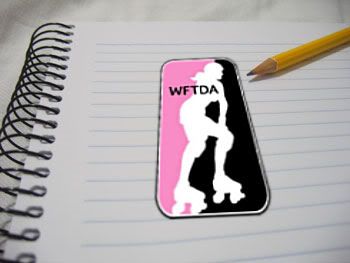 You know you have to do it, but just thinking about it makes you break out in a cold sweat. You've got flashbacks to stuffy classrooms where every pencil seems to be scratching along but yours. Imagining all those multiple choice questions and diagrams on paper in front of you makes all the rules you think know fly right out of your head and it 'aint pretty.
You know you have to do it, but just thinking about it makes you break out in a cold sweat. You've got flashbacks to stuffy classrooms where every pencil seems to be scratching along but yours. Imagining all those multiple choice questions and diagrams on paper in front of you makes all the rules you think know fly right out of your head and it 'aint pretty.
Relax. Every rollergirl that skates for a WFTDA or WFTDA-aspiring league has done it and so can you. Maybe you're taking the test for the first time as the last hurdle before getting placed on a team. Or maybe your league gives the test every season and you need to brush up on any revisions. You can give yourself a much greater chance for success if you have a plan in place and use the right strategies.
First, review what you already know
You're probably more knowledgeable than you think. For example, do you know how many whistles signal the end of a jam? How long a skater goes to the box for a major penalty? Who can call a time out? What the helmet covers mean?
Information that may seem like a no-brainer because you've already learned it by experience will still be on the written test. All those rules you've learned by doing will be one less thing to worry about on test day.
Identify the things you most need to learn
If you get called in scrimmages for penalties you don't understand, that 's a sign that you have an opportunity to learn! Talk to the refs after practice and ask them to explain the penalty to you. They're usually happy to share their knowledge, especially if you take a genuine interest in understanding the rules.
Watch some WFTDA bouts on YouTube or RollerSport.TV and pay attention to the flow of the game. Look for things that don't make sense to you. Do you understand why they're stopping the period clock, why the jammer got 4 points for a pass when only 3 blockers were on the track, or why the captain is serving a penalty when she didn't skate the last jam?
Take notes and then ask your captain, senior skaters or referees about the situation. Download a pdf of the rules and use the search function to find the answers to your questions. Pretend another skater has asked you a question and you have to research the answer for her.
The things you'll probably need to brush up on most are the rules that have to do with referee protocol and support staff, so pay special attention to those areas. Highlight or write the numbers of the rule sections that make the least sense to you.
Read the rules
First, make sure you have a copy of the rules. Paper is great, if you learn better by reading something you can hold, but otherwise I recommend having a pdf version. You can use the search function to skim through a pdf and find the section you are looking for right away whenever you want to study a specific rule.
Then, read the rules. All of them. I know this sounds tedious, which it is if you're not the sort of person who thinks reading contracts and legal documents is fun, but the best way to learn the rules is straight from the source. Think of it as your textbook for the written test.
Asking questions from others in your league is great, and encouraged, but always read the pertinent section of the rules afterward. Not only will it clear up any possible inconsistencies, it will help cement the rules in your mind by reviewing them.
You can read the rules in one sitting, if that idea appeals to you, or break it up into chunks. Decide to read one or two sections each day, or read for 30 minutes and then stop. Just make sure you get through the entire document at least once before you start studying. If you're surprised by a question on the test you didn't specifically study for, the wording of it will likely jog that bit of the rules out of your memory if you've read the whole thing.
Having read the complete rules will also make you a better player or captain, so don't skip this step! Create your study strategy
Create your study strategy
To be as prepared as you possibly can be for the test, you have to have a plan of attack for learning the information. So how do make this battle plan? Think of it like a bout. Exploit your strengths, address your weaknesses and build your confidence before tackling the test.
These general study strategies will apply to everyone:
- If you study in a group, only study with others who are serious about passing the test.
- Study at times when you naturally have the most mental energy. If you're a morning person, check out a few flash cards on the way to work. If you're more alert at night, read a section of two after dinner.
- Review the rules and your notes right after practice, or after skating, while the associated actions are still fresh in your memory.
- Don't try to cram. Space out your study times over the course of the week and focus on one area at a time.
- Learn the general concepts first; don't worry about learning the details until you have learned the main ideas.
- Take notes. Jot down a summary of the rule sections as you read them.
- Take frequent breaks to avoid overload. Tell yourself you will study one section, or study for 20 minutes and then take a 5 minute break. Don't skip your breaks!
- Make sure that you understand the rules. Don't just try to memorize everything. Get clarification from others and use strategies specific to your learning style to really cement an understanding of the rules in your mind.
- Have a fellow skater, friend, or family member quiz you on difficult areas.
You can also take advantage of your particular learning style to help you absorb information quickly. Here's an overview of some specific strategies.
Are you a visual learner? Do things "make sense when you see them"? Try some of these strategies to help you study:
- Look for visual sources of information. Use videos or Power Point presentations to help you learn.
- Make yourself some flash cards.
- Use highlighters and take notes or draw diagrams in the margins of your notes or the rules.
- Draw mind maps or concept maps to help you review and learn each section.
- Focus on the "big picture". Look through section titles, bullet points, pictures and diagrams to get an overall idea of the content before reading a section.
- Visualize. As you learn a new concept, close your eyes and imagine it playing out in a bout situation.
- Avoid visual distractions while you study.
- Read key sections of the rules aloud
- Discuss the rules with other league members. "Talk through" a situation where the rules might apply.
- Explain the rules to another skater or a study partner.
- As you read, imagine yourself giving a lecture on the subject.
- Make up rhymes, songs or mnemonics to help you recall the rules. The crazier the better.
- Write out important concepts in sentence form, then read them aloud.
- Summarize a rule section in your own words and record yourself reading it. Play it back in the car or when you're doing simple tasks like cleaning.
- Avoid noisy distractions while studying.
- Simplify the information into the basic elements and build up from there.
- Act out concepts, such as penalties, to help you remember. Use a partner for this if you like.
- Ask your league mates for real life examples of how the rules apply, or for a demonstration if you don't understand.
- Connect the rules to things you actually do in practice and scrimmages. As you study, remember the last time you were involved in the situation the rule describes. Move around if it helps.
- Draw a chart with some X's and O's, or use board game pieces to simulate things like pack formation, out of play, legal passing etc.
- Write out notes by hand. Describe a situation in which the rule section you are studying applied to you in your notes. Make it a story.
- If chewing gum, fidgeting, or pacing the room helps you relax as you study, go for it.
- If you get too restless, look over some notes or flash cards as you go for a walk.
Spend the most time on the sections you find hardest to remember or understand using the techniques that have worked best for you.
Before you study one of these difficult sections, briefly review a section you understand well to boost your confidence and settle your mind into a calm learning mode.
Taking a dummy test, or having a friend quiz you can help you pinpoint the sections you need to work on most. Revisit those sections with another quiz or dummy test to evaluate your progress.
Stay positive and confident

The night before the test, do a short, relaxed review of all your notes and remind yourself that you are well prepared and are going to do well. Resist the urge to cram!
Visualize yourself taking the test and answering all the questions confidently without any nervousness. Do this several times before you go to sleep and again just before taking the test. Get a good night's sleep and keep a positive attitude.
Test day
You'll probably be taking the test in the evening, around the time you usually practice, so make sure you're not too burned out from the day's activities. Plan some calming, pleasant things to do for a couple hours before the test like listening to music, light physical activity or whatever makes you feel alert and relaxed. If you're one of those morning people who starts to fade after work, take a short nap if you can.
Eat a light snack such as some fresh fruits and veggies before the test, but avoid greasy or sugary foods or caffeine, as they can negatively affect your focus and concentration.
Arrive early with pencils, scratch paper (if it's allowed), or anything else you need to take the test. Remind yourself that you're going to do well and imagine yourself answering all the questions to the best of your ability.
Resist the urge to talk to other skaters about the test or how you think you will do. Anxiety is contagious.
Taking the actual test

Approaching the test in a relaxed, confident way, and using some simple techniques for managing your time can help you score much higher on your WFTDA rules test.
- Stay positive and relaxed. If you start to feel nervous, take a few deep breaths and remind yourself that you are well prepared and are going to do your best.
- Get comfortable. Change positions throughout the test if you need to.
- Make sure to read all the directions carefully. It seems obvious, but it can help you avoid silly mistakes.
- Read each question carefully. Don't just skim it and assume you know what the answer is.
- If you have time, quickly look through the entire test for an overview. This will help you budget your time. If it's allowed, briefly jot down any notes that come to mind so you can refer to them later.
- Bring a watch so you can pace yourself.
- Write legibly. If the graders can't read it, they will probably mark it wrong.
- If you don't understand a question or need clarification, ask the coach or whoever is administering the test. Don't just guess.
- If you go blank on a question, skip it and go on. You can always come back to it later, and another part of the test may jog your memory or help you out with one of the tougher questions.
- Answer the questions that are easiest for you first, then answer the questions with the highest point value. Finally, come back to the more difficult questions or the ones you skipped.
- When going back to the questions you skipped, eliminate the answers that you know are wrong, don't seem to fit, or are so similar they would both be incorrect. Then, make your most educated guess based on what's left. If it's an essay question, broadly outline your answer, sequence your main points, and do your best. Don't try to b.s.
- Don't worry if other girls finish before you. Just focus on your own test.
- When you finish, review your test for any careless mistakes, and proof read your essay answers, if any. Only change an answer if you misread the question, or if you find information elsewhere in the test that indicates your first answer was wrong. Make sure your name is on the test!
Once you turn in your test, take a deep breath and pat yourself on the back for a job well done. If you have to re-take the test, don't sweat it! You'll be even more prepared for a re-take because you can review your study techniques and pinpoint what worked and what didn't.
Most of all, remember you are doing this so that you can do something fun: play roller derby!
I hope this article helped you prepare for your WFTDA written test! Good luck!
Comments? Test-taking tip you want to share? Leave them below!


